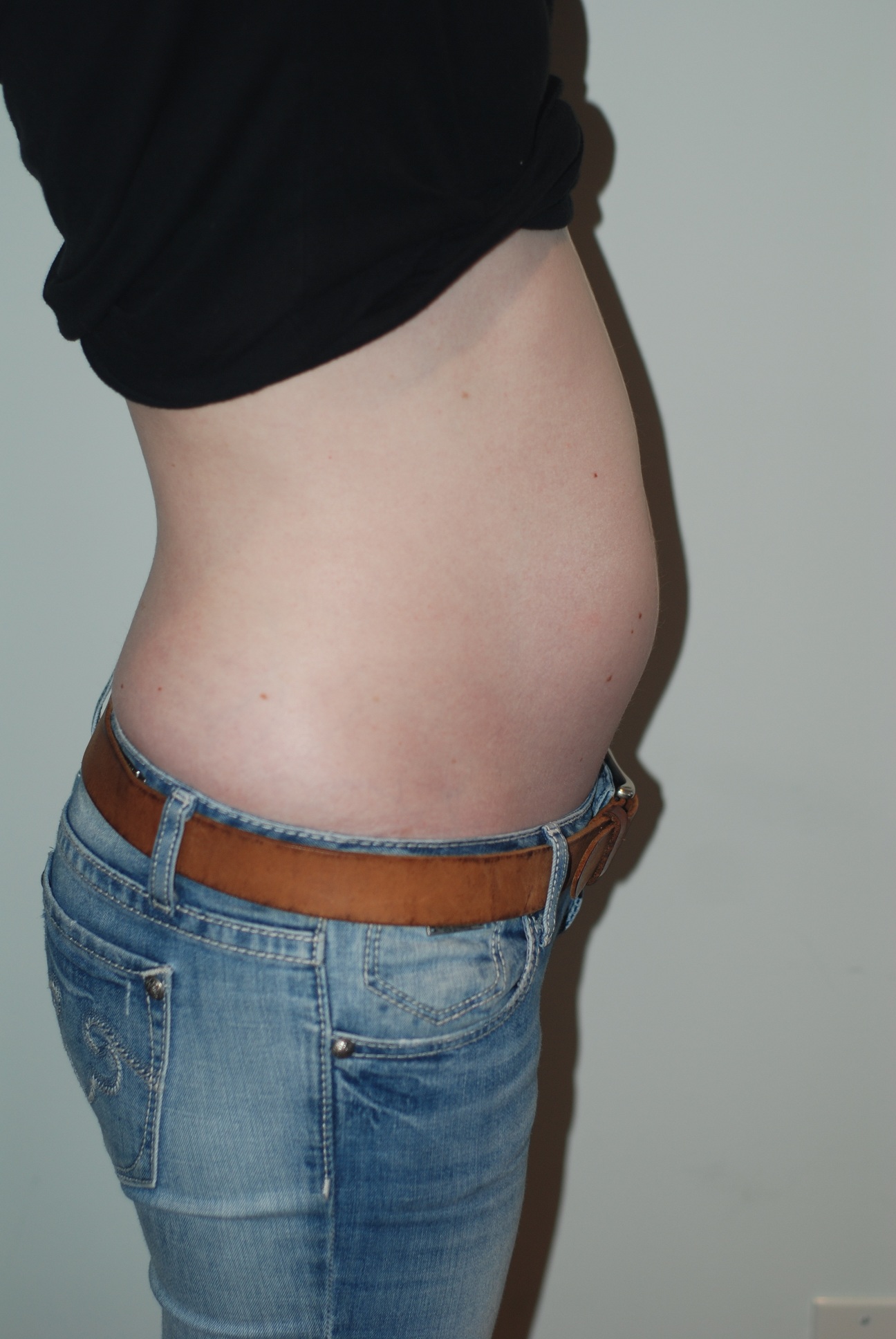It’s a common scenario: you see a woman with a rounded belly, and a wave of questions washes over you. Is she expecting? Or has she simply gained some weight? Differentiating between a pregnancy belly and a weight gain belly can be tricky, particularly for those unfamiliar with the nuances of both. This seemingly simple question delves into a complex world of physical changes, societal perceptions, and sometimes, a touch of sensitivity.

Image: www.youtube.com
This article aims to demystify the differences between a pregnant belly and a belly carrying extra weight. We’ll explore the physical characteristics, the social implications, and the importance of approaching this topic with empathy and respect. Ultimately, our goal is to foster understanding and move past the quick judgments that often accompany a protruding belly.
The Science of the Baby Bump
Pregnancy, a marvel of nature, involves a symphony of hormonal and physical transformations in a woman’s body to accommodate a growing baby. The most visible change? A steadily expanding belly. This bump isn’t just about a growing uterus; it’s a complex interplay of tissues, muscles, and hormones. Here’s a breakdown of the science behind the pregnant belly:
- Uterine Growth: As the baby grows, the uterus expands significantly, pushing the abdominal muscles outwards. This creates the quintessential “bump” shape.
- Hormonal Changes: Pregnancy hormones like relaxin soften ligaments and tendons, allowing the uterus to expand more easily. Additionally, these hormones contribute to increased blood flow and fluid retention, contributing to the overall swelling of the belly.
- Muscle Stretching: The abdominal muscles, particularly the rectus abdominis, stretch to accommodate the expanding uterus. This can lead to a visible separation of the muscles, known as diastasis recti.
- Skin Changes: The skin on the belly stretches to accommodate the growing baby. This can lead to stretch marks, a common pregnancy phenomenon.
Clues to a Pregnant Belly
While a rounded belly can be a telltale sign of pregnancy, there are other indicators that can reveal the truth. Here are some key characteristics to look for:
- Shape and Position: A pregnant belly tends to protrude in a more rounded, centrally located form, starting from the lower abdomen and gradually extending upwards. In contrast, a weight gain belly often appears more evenly distributed, with a rounder shape overall.
- Movement and “Popping”: The uterus, particularly in later stages of pregnancy, can be seen to move and “pop” as the baby shifts position within the womb. This movement is a unique aspect of pregnancy and can be a strong indicator.
- Skin Changes: Pregnancy often brings about noticeable skin changes. Aside from stretch marks, the belly skin tends to become more prominent, with veins becoming more visible.
- Breast Changes: Pregnancy often leads to significant breast enlargement and changes in nipple size and sensitivity.
Beyond the Belly – The Importance of Sensitivity
While these physical clues can be helpful, it’s crucial to avoid jumping to conclusions. It’s not always easy to differentiate between a pregnant belly and a weight gain belly, especially for those unfamiliar with the intricacies of pregnancy. It’s important to remember that:
- Every Body Is Different: Pregnancy affects every woman’s body differently. Some women may have smaller bumps, while others might have larger ones. Likewise, weight gain can manifest differently in different individuals.
- Privacy Matters: It’s crucial to respect someone’s privacy and avoid making assumptions about their weight or pregnancy status. A simple “Congratulations” or even a gentle query about their well-being can go a long way.
- Focus on Respect: Remember that regardless of the cause of a rounded belly, every individual deserves to be treated with respect and dignity. Avoid making unwanted comments or judgments.

Image: ideluca.com
The Impact of Weight Gain on Belly Shape
While pregnancy uniquely reshapes the body, weight gain can also contribute to a rounded belly, blurring the lines between the two. This is because fat deposits often accumulate in the abdominal area, leading to a noticeable protrusion.
Here are some factors that can influence how weight gain affects belly shape:
- Genetics: Our genes heavily influence where our bodies store fat. Some individuals are genetically predisposed to accumulating fat in the abdominal region.
- Lifestyle Factors: Diet, exercise levels, stress, and sleep patterns all play a role in fat distribution. Poor dietary habits, lack of physical activity, and chronic stress can contribute to increased abdominal fat.
- Hormonal Factors: Certain hormones, such as cortisol, can contribute to abdominal fat accumulation.
The Importance of Understanding and Empathy
Ultimately, whether a rounded belly is due to pregnancy or weight gain, the most important thing is to approach the situation with empathy and understanding. Assuming someone’s pregnancy or making comments about their weight can be deeply hurtful and insensitive. Instead, focus on being kind and respectful, regardless of the reason for the change in someone’s body.
Embracing the Journey
Pregnancy is a transformative journey for both the mother and the baby. It’s a time of immense physical and emotional change, and it’s important to celebrate and support women during this period. Whether a rounded belly is a result of pregnancy or weight gain, it’s essential to remember that every individual has their own unique story. Let’s approach this topic with kindness, respect, and an open heart, fostering a culture of understanding and acceptance.
Pregnant Vs Fat Belly
Resources for Further Exploration:
If you’re looking to learn more about pregnancy, weight loss, or body image, here are some resources you can explore:
- American Pregnancy Association: Provides comprehensive information on pregnancy, childbirth, and related topics. (https://americanpregnancy.org)
- National Institutes of Health: Offers research-backed information on health and wellness, including weight management and pregnancy. (https://www.nih.gov)
- National Eating Disorders Association (NEDA): Provides support and resources for individuals struggling with eating disorders and body image concerns. (https://www.nationaleatingdisorders.org)
Remember, a rounded belly is just one aspect of a person’s story. Let’s focus on empathy, respect, and understanding, fostering a world where everyone feels comfortable and supported in their journey.






